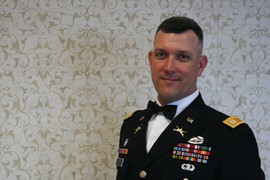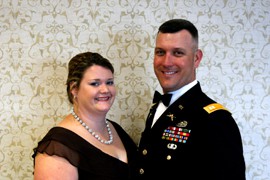Cronkite News has moved to a new home at cronkitenews.azpbs.org. Use this site to search archives from 2011 to May 2015. You can search the new site for current stories.
Arizona veteran honored at White House dinner for Iraq war service
Editor’s Note: A previous version of this story misspelled the name of Capt. Brian D. Hartman’s hometown. He is from San Manuel, Ariz.
WASHINGTON – On a night when the president and first lady honored Iraq war veterans, Army Capt. Brian D. Hartman was busy deflecting the praise.
Humble and soft-spoken, the San Manuel, Ariz., native insisted Wednesday that a White House dinner honoring scores of soldiers who served in Iraq wasn’t about them – it was about those left behind.
“I’m here to represent the fallen soldiers,” Hartman said. “The friends and soldiers and sometimes leaders that I had that paid that ultimate sacrifice.”
Hartman was one of 78 servicemen and women, from every state and territory, who dined at the White House with President Barack Obama, the first lady and other dignitaries. The Wednesday dinner was to “express the nation’s gratitude” to the more than 1 million Americans who served in Operation Iraqi Freedom and Operation New Dawn.
“I’m grateful for the support of the American people,” Hartman said. “The soldiers returning from Iraq have been welcomed and received much better than soldiers may have been in the past.”
Before the White House dinner of dry aged ribeye and chocolate creme brulee, Hartman admitted to an emotional morning reflecting on all the people he knew who didn’t survive the war, which officially ended in December.
“I just hope that I honor them and make my dad proud,” he said.
He was looking forward to meeting the president, but Hartman said he was most excited to talk to the other soldiers, some of whom he knew.
Hartman, 35, was the lone Arizona representative, chosen for his ties to the state and his achievements in Iraq where he earned three Bronze Stars, including one for combat valor – a fact his wife, Kelly, 32, volunteered for her unassuming husband.
The two met at the University of Arizona, where he earned a degree in molecular biology before enlisting in the Army in 2000.
Although his father served in Vietnam and his grandfathers in World War II and Korea, Hartman originally joined the military to just “get some experience” and planned to work for the FBI after three years. But he found his calling, and couldn’t bring himself to leave the military at a time when his country needed him most.
Hartman was first deployed from Germany to Iraq in 2004, a tour that took him to Fallujah as an armor officer.
He deployed again in 2007 to Baghdad during the surge that sent an additional 20,000 soldiers to Iraq. He spent 15 months helping train his “Iraqi military brothers” while trying to maintain security at a tough point of the war.
“There are definitely times I don’t want to remember,” Hartman said of the Baghdad deployment. “But I think we did a lot of good. I think the surge was what we needed to get where we are today.”
Hartman deployed again from 2009 to 2010 in Kirkuk province as company commander of a security transition team, again working to help Iraqis take control.
“That was the most fulfilling part about deploying those three different times, seeing the progression of the Iraqi military and police force there,” he said. “It was a long time there, but we did make an impact. We did achieve what we wanted to do.
“They came a long way,” he said of the Iraqis. “They’re ready to secure the nation on their own.”
The Hartmans – with son, Wesley, 5, and daughter, Megan, 4 – have spent the last nine months in DeRidder, La., while he is stationed at Fort Polk helping soldiers prepare for deployment to Afghanistan.
Though they have traveled the world, Arizona is still home and is one of a few places the Hartmans want to retire.
But Hartman isn’t done with his military service yet, and said he will go to Afghanistan if called.
“I’m a soldier 24/7, so it’s a possibility,” he said. “You don’t want to sit on the sidelines … if you deploy, it’s part of the job.”








